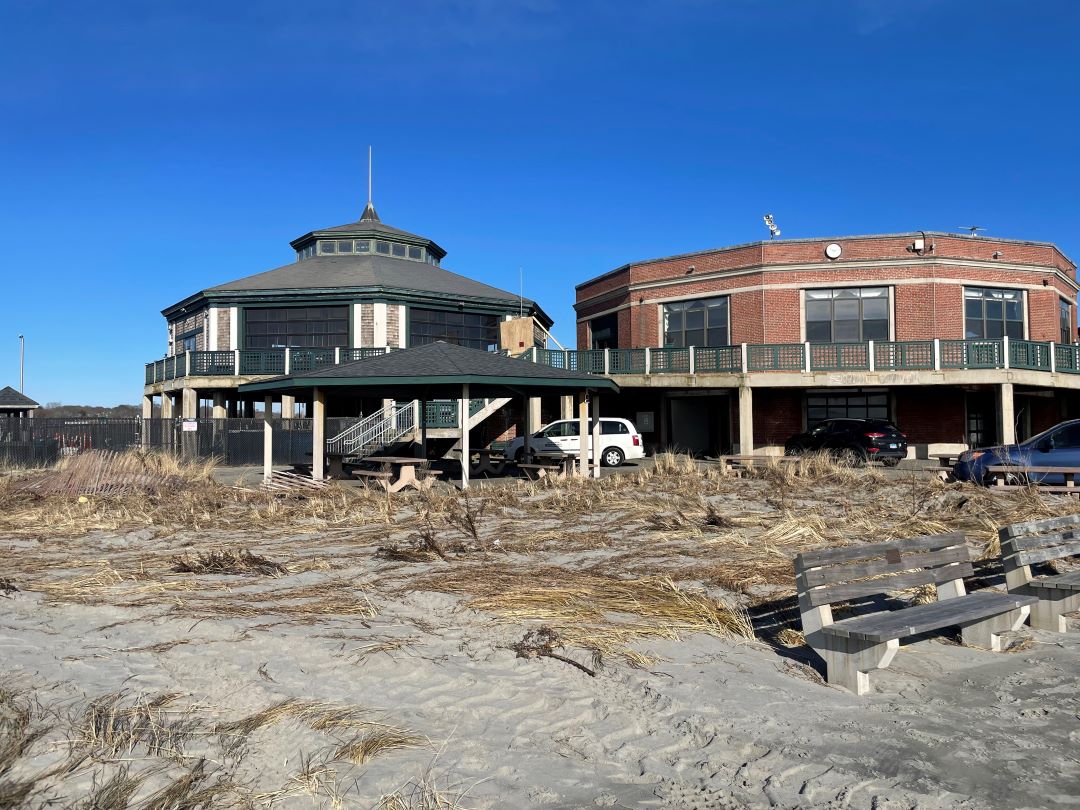New England States Mostly Quiet on Transportation Climate Initiative
December 25, 2019
The latest regional plan to reduce greenhouse-gas emissions was launched with little fanfare in Rhode Island and united opposition from fossil-fuel front groups. There was even criticism from environmentalists.
New England states hardly offered a full-throated endorsement of a draft proposal of the “cap and invest” program released by the Transportation & Climate Initiative (TCI) on Dec. 17. New Hampshire Republican Gov. Chris Sununu quickly denounced the program, calling the fee on gasoline and diesel-fuel imports “a financial boondoggle.”
Vermont Republican Gov. Phil Scott said he is reviewing the proposal. Connecticut Gov. Ned Lamont, a Democrat, has also been silent on the draft memorandum of understanding (MOU).
Since the MOU was released, Massachusetts Gov. Charlie Baker, a Republican, has been the only governor to speak publicly in favor of the TCI. Baker is invested in the 12-state partnership, having already promised that half of the proceeds will support an $18 billion transportation bond. Massachusetts Energy Secretary Kathleen Theoharides serves as chair of the TCI leadership team.
The Rhode Island Department of Environmental Management, the agency overseeing state TCI administration, expected a press release from Gov. Gina Raimondo endorsing the latest proposal but none was ever issued.
The governor’s spokesperson, Jennifer Bogdan, said Raimondo supports a regional approach to addressing the climate crisis but didn’t offer the governor’s stance on the TCI cap-and-invest proposal.
“Last week launched a public conversation around these proposals, and the governor looks forward to hearing from Rhode Islanders as TCI starts work to find a collaborative path towards economic growth, reduced carbon emissions, cleaner air, and an improved transportation system,” Bogdan said.
Last December, nine states and the District of Columbia agreed to design a regional plan for cutting transportation-sector emissions. Twelve states have participated in the planning, and it’s up to each to enact the latest proposal. But having unified involvement is necessary to prevent nonparticipating states from obtaining an economic advantage with lower fuel prices. Most states, including Rhode Island, will require legislative approval to adopt the emissions-cutting proposal. Baker has said he holds the authority for Massachusetts to participate.
The cap-and-fee approach is modeled on the nine-state Regional Greenhouse Gas Initiative, but instead of power plants, fuel distributors would be required to buy allowances through an auction for exceeding emission limits, which decline annually. TCI’s auction proceeds — an estimated $5 billion to $7 billion annually — would be returned proportionally to participating states and invested in improvements in cleaner transportation, such as infrastructure for electric cars and buses and expanding public bus and rail service.
The cost at the pump will depend on which scenario each state selects. A 20 percent target reduction increases the price of a gallon of gas by 5 cents. A 22 percent reduction increases fuel prices 9 cents. A 25 percent cap-reduction scenario increases prices an estimated 17 cents.
Right-wing opposition mounted a negative campaign before the latest TCI proposal was even announced. The day it was released, 18 conservative groups issued a letter stating the oft-repeated argument that the TCI plan unfairly burdens low-income and rural populations.
Prompted by conservative talk radio and nearly daily anti-TCI stories in the Boston Herald, negative remarks are flowing into TCI’s public comment portal.
Some critics believe TCI’s goals are too timid, noting that under the “business-as-usual” scenario emissions are already expected to fall 19 percent because of improving fuel-efficiency standards and electric vehicle sales.
“My concern is that this initiative will create the perception that something is being done about climate change, when this is utterly, utterly, inadequate,” said professor Timmons Roberts of Brown University’s Climate and Development Lab.
Roberts referred to a recent Brown University study showing how Rhode Island can reduce transportation-sector emissions by nearly 100 percent by 2030 — a model he said other states can follow.
The Sierra Club has called for a 45 percent reduction goal, one that aligns more closely with Rhode Island emission-reduction targets. The environmental activism group Climate Action RI called the TCI proposal “outrageously weak,” noting that scientific consensus calls fort a 50 percent emissions reduction by 2030 — a reduction of 7.6 percent annually.
Other environmental groups, such as the Acadia Center, the Conservation Law Foundation, and the Environmental League of Massachusetts (ELM), insist TCI is worth adopting.
“With the disappointing international climate talks last week and the lack of federal leadership, it is all the more important that states make urgent progress on reducing climate-warming pollution,” said Nancy Goodman, ELM’s vice president for policy.
Traditional energy companies expressed support for the proposal. A shared statement by National Grid, New Jersey-based Public Service Enterprise Group, and utility company Exelon called the TCI plan “an important step” for cutting greenhouse-gas emissions.
Public comment on the TCI is open until Feb. 28.
The 12 participating states are Connecticut, Delaware, Maine, Maryland, Massachusetts, New Hampshire, New Jersey, New York, Pennsylvania, Rhode Island, Vermont, and Virginia.
A final MOU is expected to be released this spring. Each state will then decide legislatively or otherwise whether to sign the final MOU and participate in the regional program. Once implemented, the initial phase of the TCI program will run from 2022-2032.
Categories
Join the Discussion
View CommentsRecent Comments
Leave a Reply
Your support keeps our reporters on the environmental beat.
Reader support is at the core of our nonprofit news model. Together, we can keep the environment in the headlines.
We use cookies to improve your experience and deliver personalized content. View Cookie Settings




Good article. But the underlying problem is not fossil fuel barons, its the majority of the population wanting to drive and fly everywhere at minimum cost. Thus they oppose tolls, auto excise taxes, gas tax increases, bike lanes that slow them down, and demand ever more parking while buying gas guzzling trucks and SUVs. Meanwhile Amtrak issues including the Trump regimes’s threat to its existence are ignored (even though already electrified here) while hopes for expansion in SW RI and CT run into NIMBY opposition.
So reflecting that reality, RI is subsidizing driving even more, phasing our property taxes on cars (already costing over $90 million this year) plus spending a fortune to widen I-95 north and fully rebuild the 6-10 intersection over community opposition, plus cutting millions from the bike/pedestrian program, plus proposing to make bus use more difficult by destroying the Kennedy Plaza bus hub (and maybe Pawtucket’s too.)
But no use blaming the politicians, they can see what happens if driving costs are raised – recall the Sakonnet toll protests, disruptive protests in France ("yellow vests") and elsewhere, even Iran, when gas prices were to be raised. And generally the environment community goes along with all of the above, (most driving everywhere themselves) recognizing that is democracy, and, as the post suggests, the right-wing is poised to take full advantage of anything that raises gas prices.
What can be done is that some can be bribed by vast subsidy to buy an electric vehicle (the $7500 Federal tax credit) which will help a bit to reduce greenhouse emissions, though it would do nothing to help land use, road safety or promote more truly zero-emission travel by biking or walking. There is also some political will to improve the commuter rail through electrification and more extensive service. But unless they make it fare-free (as Kansas City is seriously considering) I doubt much can be done to make RIPTA significantly more effective and unless we have the will to put in separated bike lanes the same goes for biking. And so far cutting aviation emissions isn’t even under consideration, especially as all the big shots fly a lot. So though I hope I’m wrong, its hard to be optimistic about the TCI actually accomplishing strong goals.
Nailed it, Barry. Americans are convinced that somewhere in the Constitution, stated or implied, is a clause guaranteeing all of us a free lunch.
…In the meantime, what we can focus upon are attainable short term goals like electing a new President—any new President—and at least chipping away at our State legislature in hopes that someday relatively soon we can reform it from top to bottom. Then maybe we can get to a point where a politician can get away with a platform stating "If you want something you gotta pay for it."
Yes Bill, and a new Governor, who will appoint a new cabinet and advisory team that will take a stronger leadership role in how the state addresses climate change. From the start, there should be an independent analysis of all state agency operations to identify ways to reduce carbon emissions, increase carbon sequestration by increasing forest acreage rather than slowly watching it ebb away, ameliorate the impending impacts of sea level rise, etc, etc. The state can be a leader for the business community by setting timetables for electrifying a reduced vehicle fleet, adjusting employee schedules to reduce travel and commuting time, eliminating use of equipment that uses fossil fuels, etc. As a former state employee, I know there will be many ways found to reduce the state’s share climate footprint, but the will to implement most will be limited unless there is strong leadership at the top. But the hope would be that some of the state solutions would be adopted by businesses, and down to their employees.